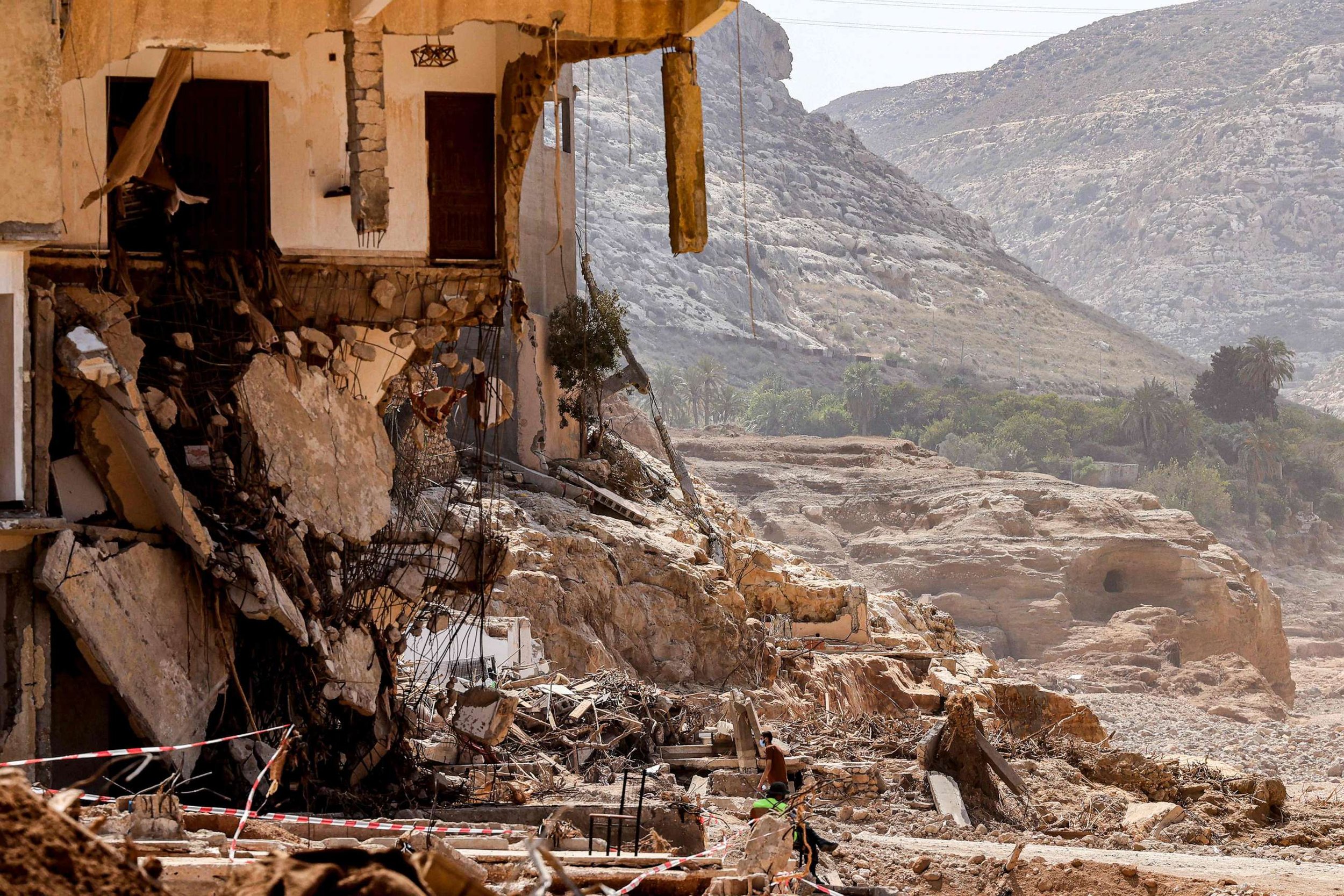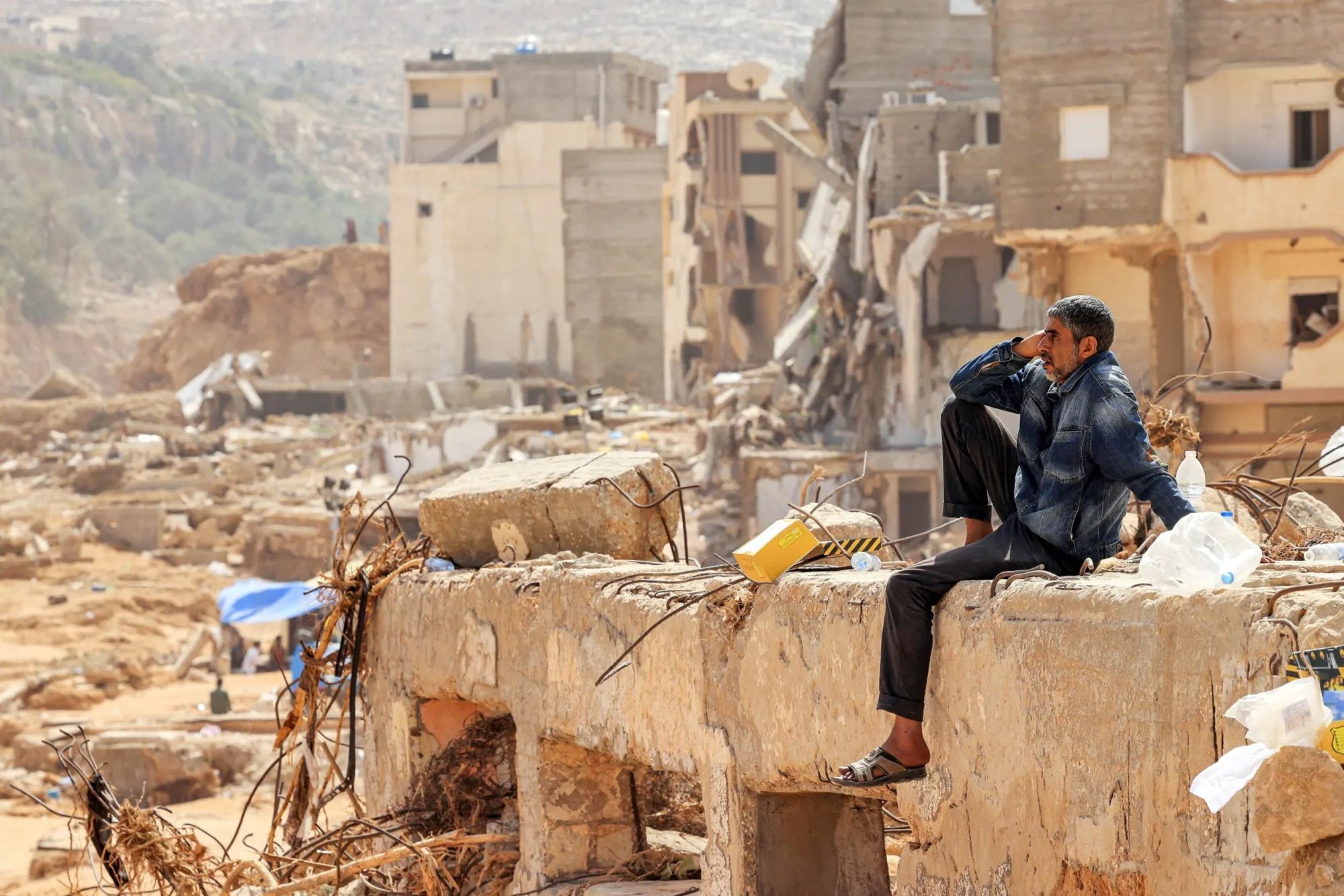Flooding in Libya
Photo Credit: Karim Sahib/AFP/Getty Images via ABC News
Tropical Storm Daniel first passed through Libya on Sept. 10. Heavy rainfall and strong winds plagued the country, leading to major flooding and significant destruction throughout the northeast of the country.
The eastern Libyan coast city of Derna was significantly affected by extreme flooding when two local dams burst due to excess pressure from Storm Daniel. This occurred either late on Sept. 10 or early on Sept. 11. Twenty-four million tons of water from the broken dams engulfed their city. As the water flowed downwards, it picked up an immense amount of power, and witnesses say the mass of water became over three metres tall.
The total death toll of Storm Daniel remains unknown, since many bodies have been washed out to sea. However, in Derna, which has a population of around 90,000 people, over 4,000 people have been confirmed dead, according to the BBC. Another 10,000 have been reported missing, and at least 43,000 people have been displaced after their homes were damaged or destroyed.
In preparation for Storm Daniel, authorities in eastern Libya held emergency meetings and issued directives to the local population. These instructions primarily revolved around evacuating coastal and low-lying areas in Derna, as well as imposing stay-at-home orders for other parts of the region and surrounding areas.
While authorities made announcements telling people to move to “safe places”, they did not give specific directions for where shelter could be found. Additionally, many people did not hear any of the warnings. Numerous residents of Derna also complained that Libyan authorities only announced the threat posed by Storm Daniel through a Facebook post. They did not want to rely on merely television and social media for emergency announcements and alerts.
Photo Credit: Karim Sahib/AFP/Getty Images via NBC
Libyan authorities also gave conflicting instructions, and reportedly advised people on evacuating people to the wrong parts of the city. “Many of those that evacuated from the beaches went into central Derna, where they were killed by the later flooding,” explained a resident of the city.
However, one critical announcement from eastern authorities simply never made it to Derna’s residents. It was supposed to warn them about the potential danger posed by the dams in Derna of failing or overflowing.
Dr Abdulwanis Ashour, a hydrologist from a university in Libya had conducted years of research on the conditions of the dams. He told the BBC that he had previously discovered that the dams could face a significant amount of rainfall and were in great danger of collapsing. He also highlighted that many other studies and reports had consistently proven the risks presented by the dams to Derna and nearby areas. According to the hydrologist, the reports were well known within the Eastern Libyan government and other authorities.
The Office of Libya’s Public Prosecutor, who is a part of the opposing western government, made orders for the arrest of 16 officials responsible for overseeing Libya’s dams on Sept. 25. This was part of an investigation into the potential negligence of flood-related responsibilities and dam maintenance. It remains uncertain if any of the officials have been arrested.
Many have criticised the emergency response of Eastern government officials in Derna. In an uncommon display of solidarity from a severely divided country, as calls for help from Derna were answered with quick responses from numerous aid workers from the opposition government in the west. These aid workers began delivering crucial supplies to survivors but were denied access into Derna.
“Nothing and no-one gets in without their permission,” said one Libyan aid worker, referencing the government’s control of aid entering the region. The Libyan Red Crescent was the only humanitarian organisation allowed to operate in Derna at the beginning of the crisis.
“Haftar and his forces only placed their trust in the Red Crescent, but we couldn’t do much because the crisis was so massive. We desperately needed all the help we could get,” the aid worker, who had lost friends and relatives to the flood, shared with the BBC, requesting anonymity due to concerns about being targeted by General Haftar’s troops. They voiced their frustration, explaining that General Haftar prioritised security and politics over rescuing and helping Derna’s distressed residents.
General Haftar has been part of the Revolutionary Command Council that has been governing Libya after taking control of the country during a coup in 1969. He is currently the Supreme Commander of the Libyan National Army.
The Libyan aid worker mentioned that security personnel spent a large amount of time closely inspecting essential aid supplies due to concerns about potential weapon smuggling into the city. Derna’s people went without food, clean water, or medical help for days, while important aid supplies were held up and checked.


